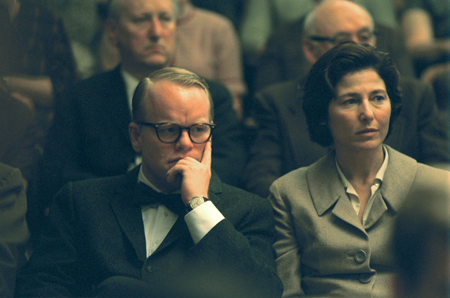

Reviews of Recent Independent, Foreign, & Documentary Films in Theaters and DVD/Home Video
Directed by: Bennett Miller. Produced by: Caroline Baron, Michael Ohoven & William Vince. Written by: Dan Futterman, based on the book Capote by Gerald Clarke. Director of Photography: Adam Kimmel. Edited by: Christopher Tellefsen. Music by: Mychael Danna. Released by: Sony Pictures Classics. Country of Origin: USA. 114 min. Rated: R. With: Philip Seymour Hoffman, Catherine Keener, Clifton Collins, Jr., Chris Cooper, Bruce Greenwood, Bob Balaban & Amy Ryan. DVD Features: Two commentaries by Bennett Miller & Philip Seymour Hoffman; Miller & cinematographer Adam Kimmel. "Answered Prayers" documentary (7 min.) Two making-of featurettes. English, French, Spanish, Portuguese, Chinese, Korean, Thai & Bahasa subtitles.
Philip Seymour Hoffman is restrained in a performance that could easily
have careened out of control. Hoffman doesn't lisp. Nor does he trivialize
the flamboyance that made Capote a darling among the glitterati and a
persona non grata just about anywhere else. Hoffman is fortunate to have
been handed a script that refuses to whitewash Capote's many faults. This
Truman Capote is selfish toward his long-time companion Jack Dunphy (Bruce
Greenwood), and downright ungrateful to Harper Lee (Catherine Keener),
Capote's research assistant on In Cold Blood (and the Pulitzer Prize-winning author of To Kill a Mockingbird). He repeatedly manipulates
and lies to Perry Smith (Clifton Collins, Jr.), the murderer who is
something like the romantic lead of the film. Smith enthralls Capote - they
were both abandoned children. Crisp dialogue has Capote put it this way: "It's as if Perry and I grew
up in the same house. And one day he went out the back door and I
went out the front."
Dunphy and Lee both suggest to Capote that he loves Smith and wants
his execution to be over and done with. Then and only then, they infer,
can Capote finish In Cold Blood; he would have the perfect
ending. Capote replies he doesn't see how both can be true. (What
Capote failed to realize is what Oscar Wilde, in many ways his predecessor,
did - that men like Capote and Wilde kill what they love best). The fact
that Capote can't see the obvious is what adds to the film's pathos.
There's not a household name among the supporting cast, but each of the
actors takes a comfortable back seat to Hoffman's tour de force. In fact,
Hoffman's performance may in its way be one of the film's only flaws. This
film is Philip Seymour Hoffman’s show. First, Hoffman's name
flashes across the screen as an executive producer. Not too long after, the
bodies of under-developed minor characters begin pile up. Jack Dunphy is
little more than the patient lover and Harper Lee, the mature, moral
counterpart to Capote's childish misbehavior. Only Collins, in a scene very
much like the climax between Susan Sarandon and Sean Penn in Dead Man
Walking, gets to shine as brightly as Hoffman. In retrospect,
Tru, the one-man Broadway play, made the wisest of artistic decisions.
Why? Because it's hard for others characters to compete with Capote.
Capote may be limited in its appeal. It's not so much a gay film as
an academic exercise. But limited appeal was clear from the outset and by
the time the closing credits role, a filmmaker's badge of courage.
DVD Extras: All of the special features might be justified if the talking heads – mostly cast and crew – didn’t repeat themselves from commentary to commentary and then again from documentary to documentary. Capote is a well-acted and deliberately-paced film. So do we really need to be told twice, for instance, that the muted musical score is meant to force the audience to slow down? Do we really need to hear Philip Seymour Hoffman repeatedly express his insecurities about his performance in his Oscar-winning role? The documentary “Answered Prayers” does provide some basic facts about Capote’s life and includes footage from his days on the talk show circuit, which will be of interest to those unfamiliar with the writer. But newcomers to the film, and those familiar with Capote, will want to focus on the well-crafted film, which actually grows better with repeated viewings. Steven Cordova, contributing editor and poet (Slow Dissolve, Momotombo Press)
|